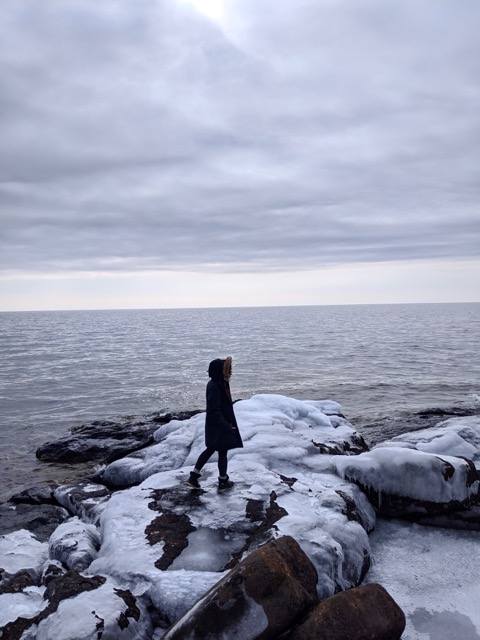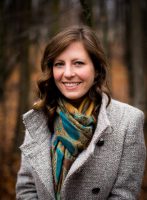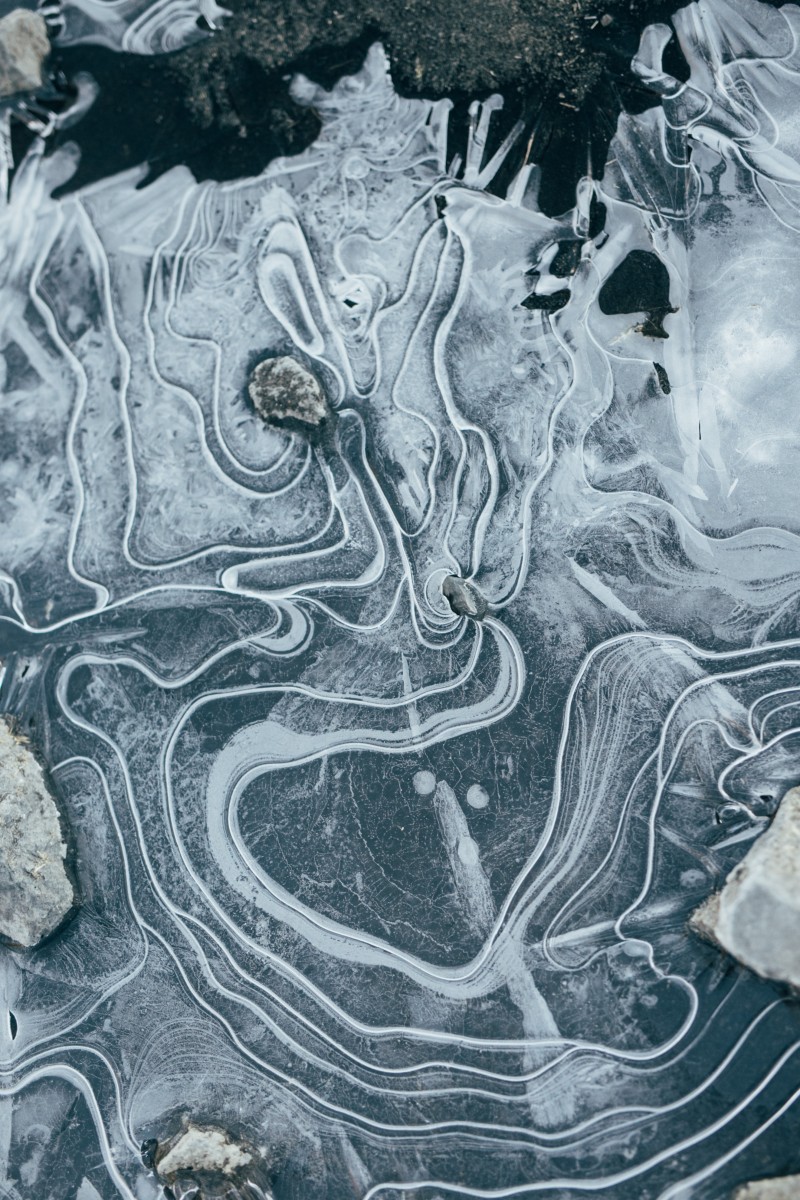
It takes a courageous runner to brave the race.
NER author Lindsay Starck (pictured left, walking the icy shore of Lake Superior) talks to NER editorial panel member Evgeniya Dame, sharing the story behind “Baikal” (NER 41.1) and its roots in the annual winter marathon across the largest and deepest lake in the world.
Lindsay Starck: Yes! It feels so unbelievable. I remember reading the first few paragraphs of a news story about the marathon when I was standing in line at a coffee shop. I was so hypnotized by the video header, which showed a line of tiny runners trekking across an endless expanse of ice, that the barista had to call my name repeatedly. I’d never heard of this race, which has taken place annually since 2005 (when conditions permit) across the largest and deepest lake in the world. Baikal contains nearly a quarter of the earth’s fresh water, which is exceptionally clear; it’s ringed by mountains and is home to distinctive flora and fauna such as the famous Baikal seal; and it’s full of geothermic springs that bubble up, even in the winter, to melt holes in the ice. It takes a courageous runner to brave the race, and as I prepared to write this piece I sought out stories of those who had attempted it. I studied photos, videos, and written accounts, which is where I learned, for example, about the “hummocks” (ice rubble) that spackle the surface, the tents on the course, the hovercraft rescue-missions, and the perception of the lake as a living being.
ED: Have you ever run a marathon? What helped you get in the mind of a runner?
LS: I am a runner, but not a marathoner. My father, however, has run thirty marathons; he tends to collect them as one would collect vintage coins or passport stamps. So I’ve been in the crowds, waving homemade signs and cheering the runners as they plod past mile fifteen, twenty-three, etc. I’ve attended the pasta dinners held in heated tents on the eve of the race, and I’ve been close enough at the finish line to see the faces of the runners as they take those final steps. I’m always astounded at their fortitude, but also worried about the toll that the race can take on their bodies!
ED: Visually, your story looks very distinct on the page: paragraphs interspersed with short questions. When I read the story, I immediately fell into the rhythm that those questions created. How did this structure arise?
LS: As someone who does not possess the fortitude or willpower necessary to run across Lake Baikal, I had questions for my character: namely, “How?” and “Why?” From the beginning, I was interrogating her. As I wrote more, it became clear that the central relationship of the piece had been shaped by unspoken questions. When I read that the founder of the race had described Baikal as “alive” and “breathing,” I wondered if the narrator could be the lake itself. I’ve long admired the “Ithaca” episode of James Joyce’s Ulysses, which is written as a catechistic call-and-response, and also John Edgar Wideman’s “Stories,” which is a flash fiction piece composed of “question after question after question.” Finally, one of my favorite remarks about literature is Anton Chekhov’s observation that the artist’s task is not to answer questions but to pose the questions correctly.
ED: I love the way “Baikal” engages the environmental themes while making them serve the story and the character. Are you often drawn to these themes in your writing?
LS: Yes! Especially recently. It was late March when I came across the article about the marathon, which meant that soon the ice would be breaking up on the lakes near where I live . . . And as I walked across the parking lot to my car, I imagined a woman running across the lake while the ice cracked open behind her, racing against time the way that we’re all racing against climate change. My stories are centered on relationships, but to me those relationships are most interesting—and truest—when set against the backdrop of a specific environmental, political, or cultural moment. I recently published a short story about the last remaining Pinta Island tortoise on the Galapagos Islands, and I’m in the process of sending out two pieces that are also climate-themed: one about a future water shortage in California, and one about a guy who leads tours for people who want to see species on the brink of extinction.
ED: There is a beautiful passage in your story that describes the main character’s reaction as her husband reads poetry to her. “Sometimes, as she tilted over the towering precipice of sleep, her temple throbbing and her skin burning, she’d think she heard something between the lines: something the poet was reaching for but couldn’t find the words to say. The poem behind the poem.” This concept—the poem behind the poem— sounds fascinating. Is this a common notion?
LS: That’s a great question! I don’t believe the phrase itself is all that common, but to me the idea feels central to the work of countless writers. I’ve long been interested in the use of literary constraints—from sonnets or pantoums in poetry to specific word counts in flash fiction to the question-answer format you see here—in part because language itself is a constraint that writers strive to transcend. We always want to say more than what we can actually get onto the page; with every word we type, we lose the possibility of infinite alternatives. As Italo Calvino wrote, “The struggle of literature is in fact a struggle to escape from the confines of language; it stretches out from the utmost limits of what can be said; what stirs literature is the call and attraction of what is not in the dictionary.” That’s what I had in mind when writing this passage: the poem on the page is the ghost of the poem you were trying to write. And the idea seemed to work well with the image of the marathon’s finish line, which feels tantalizingly close but also unreachable even from the start.
ED: I guess literary constraints are restrictive and freeing at once. I remember reading a Rick Moody interview in which he spoke about his love for them. He said limitations make him feel “energized.” Is there a literary constraint you’re thinking of trying next?
LS: I agree with Rick Moody! The novel that I’m working on actually began with a constraint: there are a number of first-person narrators, and I wanted each narrator to be addressing someone else in the novel, rather than simply addressing the reader. Over the course of several revisions, I’ve had to let go of that original idea; but, like any good constraint, it propelled me through my draft and taught me a lot about the characters and their connections to one another, so it definitely served a purpose.
ED: Could you share a book or two that you’ve been reading during these strenuous times?
LS: I’ve found solace in Richard Powers’s The Overstory, a gorgeous ode to the natural world which does a wonderful job reminding humans of how brief and inconsequential our lives are when compared to, say, the lifespan of a sequoia. I know that may not sound particularly comforting, but it helps me to remember that even though this pandemic feels like it’s lasting forever, it’s really only a blip. (The novel is also an important reminder that the pandemic is only one of many crises the world is currently facing.)
I’m also trying to memorize more poems, as I find something meditative and peaceful and rhythmic in this act of complete attention. I’m grateful for the chance to inhabit someone else’s language and vision for a while. Some recent pieces I’ve memorized have been Jamaal May’s “There Are Birds Here,” W. S. Merwin’s “To the New Year,” and Naomi Shihab Nye’s “What Changes.”
ED: Thank you!
 Lindsay Starck was born in Wisconsin and raised in the Milwaukee Public Library. Her first novel, Noah’s Wife, was published by G. P. Putnam’s Sons in 2016. Her writing has recently appeared in Southern Review, Ploughshares, and Cincinnati Review. She teaches and writes in Minneapolis, where she swims in the lakes and skis in the streets. She lives with her husband and a geriatric golden retriever.
Lindsay Starck was born in Wisconsin and raised in the Milwaukee Public Library. Her first novel, Noah’s Wife, was published by G. P. Putnam’s Sons in 2016. Her writing has recently appeared in Southern Review, Ploughshares, and Cincinnati Review. She teaches and writes in Minneapolis, where she swims in the lakes and skis in the streets. She lives with her husband and a geriatric golden retriever.
Evgeniya Dame studied English in Samara, Russia, before coming to the US on a Fulbright Fellowship to pursue fiction writing at the University of New Hampshire. Her fiction appears or is forthcoming in Southern Review, Ploughshares, and Joyland, and has been nominated for the Pushcart Prize. Her nonfiction and interviews have appeared in Electric Literature and New England Review online. She is the recipient of a Monson Arts Residency Fellowship, Martin Dibner Memorial Fellowship for Maine Writers, and the Young P. Dawkins III prize for best MFA thesis at the University of New Hampshire.
Filed Under: Fiction, News & Notes Tagged With: Evgeniya Dame, Lindsay Starck


 What was she thinking?
What was she thinking?